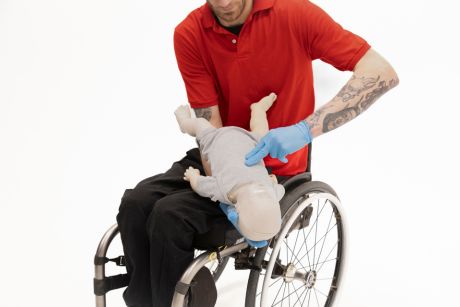For Andrew DeGruchy, volunteering is a part of his life. The 30-year-old has been a volunteer firefighter and Lieutenant with Cold Lake Fire-Rescue for eight years. When evacuees from the La Ronge, Saskatchewan area were sheltered in Cold Lake, he got a first-hand look at the work Canadian Red Cross volunteers do; and that prompted him to become part of the disaster management team.
80
Latest Posts
Debby Cote, Program Manager for Asia at the Canadian Red Cross took a moment to talk to us about the regional resilience initiative, and how the program is working to help build the resilience of partner Red Cross and Red Crescent societies.
By 9 a.m., fog has burned off and I am already looking for shade as we begin the hour-long walk through the makeshift settlement in Kutupalong. We are headed to the Bangladesh Red Crescent Society mobile clinic. After many trips, we know the trail reasonably well, only occasionally needing the local volunteers to guide us through new market areas or construction sites, which seem to appear everyday along the route. We are from different worlds - Bangladesh, Myanmar and Canada - yet we chat easily about the work day to come. What was chaotic and overwhelming a few weeks ago has become familiar – it is easy to forget that this great sprawling village is one of the largest camps of displaced people in the world.
On December 11th, 2017 a fire broke out at the Crestview Housing Cooperative in Moose Jaw, Saskatchewan damaging several of the apartments and displacing a lot of the residents. In an overwhelming show of support, the citizens of Moose Jaw, with help from some teams from the Canadian Red Cross, rallied to the scene.
In this blog, we'll guide you on how to help a choking baby, where baby refers to an infant who is less than 1 year old. But remember, taking a first aid course is the best way to be prepared for situations like these!
The people of Eastern Ghouta have had to endure weeks, months and even years of fighting.
I had the opportunity to visit two of the camps that are now hosting thousands of people who are not only hungry and in many cases sick, but also tired. Tired of living in conflict. Tired of not being able to live a normal life.
Even when kids wear flotation devices and water wings, the water can quickly become a source of stress for parents. That’s why the Red Cross strongly recommends signing kids up for swimming lessons when they are just months old.
The day after Christmas in Prince Albert, Saskatchewan this year was chilly: -35C chilly. Carmen, Jordy, one-year old Otis and the family cat decided to enjoy a fire in their fireplace to warm up. They didn’t know that a squirrel had been hoarding pinecones in their chimney. Their living room quickly filled with smoke and soon the roof of their old home was in flames.


